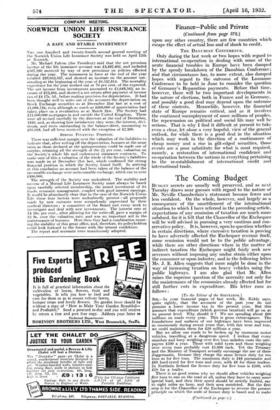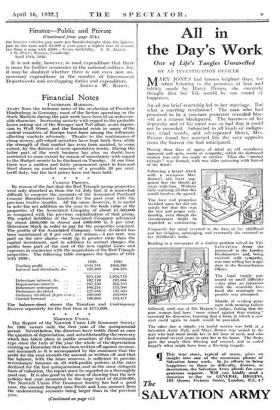The Coming Budget
BUDGET secrets arc usually well preserved, and as next Tuesday draws near guesses with regard to the nature of Mr. Neville Chamberlain's statement become fewer and less confident. On the whole, however, and largely as a consequence of the unsettlement of the international situation to which I have referred in the preceding article, expectations of any remission of taxation are much more subdued, for it is felt that the Chancellor of the Exchequer will be well advised in pursuing a very cautious and con- servative policy. It is, however, open to question whether in certain directions, where excessive taxation is proving to have adversely affected the Exchequer revenue itself, some remission would not be to the public advantage, while there are other directions where in the nuitter of indirect taxation the Exchequer might fairly seek new revenues without imposing any -undue strain either upon the consumer or upon industry, and in the following letter Mr. J. E. Allen suggests that more might be done in the way of increasing taxation on heavy vehicles using the public highways. I ant also glad that Mr. Allen raises the supreme question of the necessity not only for the maintenance of the economies already effected but for still further cuts in expenditure. Ills letter runs as follows : [To the Editor of the SrEc■rATon.1 Sra,—In your financial pages of last week, Mr. Kiddy says, quite rightly, that the accounts of the past year do not promise a lower income tax in the present year. But this assumes that expenditure (which governs taxation) will go on at its present level. Why should it ? We are spending about £60 millions on roads every year. This is gross extravagance. The foundations and surfaces of our highways have been improved so enormously during recent years that, with fair wear and tear, we could maintain them for £20 millions a year. But we allow our roads to be broken up by enormous motor vehicles, travelling at a dangerous speed. I reckon that every omnibus and lorry weighing over five tons unladen costs the rate. payers £500 a year. Those with solid tyres and those weighing over seven tons probably cost £1,000 each. Yet the Treasury and the Ministry of Transport actually encourage the Use of these , Juggernauts, because they charge the same 'licence duty for ten tons as for five tons. The maximum duty is £48 pneumatic and £60 hard-tyrod for five tons and over, with £6 for three trailers. In Northern Ireland the licence duty for five tons is £100, with £10 for a trailer.
There is no good reason why we should allow vehicles weighing ,five tons to run on the road at all, unless they have to carry some 'special load, and then their speed should be strictly limited, say to eight miles an. hour, and their area restricted. But the first 4dep is for the Chancellor of the Exchequer to reverse the present ;principle on which the scale of licence duty is based and to make • ,(Conrinned on pnge v.) Finance—Public and Private (Continued from page 574.) the heavier vehicles pay more per hundredweight than the lighter, just as the man with £1,000 a year pays a higher rate of income tax than a man with £500.—Yours faithfully, J. E. ALLEN.
2 St. Peter's Terrace, Cambridge.
April 11th, 1932.
It is not only, however, hi road expenditure that there is room for further economies in the national outlays, for, it may be doubted whether there is not even now un- necessary expenditure in the number of Government Departments and overlapping duties and expenditure.
ARTHUR W. NIDDV.









































 Previous page
Previous page